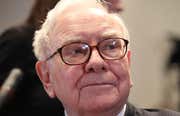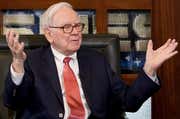|

|
Warren Buffett has a jaw-dropping net worth of over $84 billion (as of December 2017). By far the biggest part of his net worth is his shares in Berkshire Hathaway, the company he began acquiring in 1962. Over the past 55 years, Berkshire Hathaway has expanded from a textile manufacturer into an international conglomerate with investments in industries such as insurance, food and beverage, banking and private aviation.
Warren’s main investing influence was Benjamin Graham. Graham is well-known in investing circle as the father of value investing. Warren dreamed of working for Graham's partnership, and in 1954 Warren got his chance when he was offered a job at Graham-Newman. For two years, Warren learned how to be a more disciplined and successful investor under Benjamin’s watch. When the Graham-Newman partnership wound up in 1956, Warren used what he had learned to create his own partnerships in Omaha. These partners would one day become early Berkshire Hathaway shareholders.
Another strong influence on Warren’s life is his long-time business partner Charlie Munger. Charlie is a former lawyer turned investor who started his own partnership in the 1970s. Despite being in Warren’s shadow, Charlie is an impressive investment manager and posted annual compounded returns of almost 20% while running his own investment fund. (For more, see: 5 Corporate Business Duos.)
Warren and Charlie first met in 1959 and became good friends right away. While Warren is the person who gave Charlie the idea of starting an investment fund, Charlie has been credited with helping Warren see the bigger picture and influencing him to diversify his investments away from Benjamin Graham’s teachings once Berkshire Hathaway started growing.
Value Investing
Warren Buffett's investing philosophy is often called "value investing" because it looks at the underlying value of a company rather than at the movements of its stock price. Buffett famously believes that investors should only pick stocks they believe they can hold forever. This may be part of the reason why Buffett has tended to invest heavily in a handful of major companies over the years.
Value investing is a highly disciplined practice for Buffett. He has given many succinct but incisive rules of thumb for investing in his famous letters to shareholders, in investing publications and the popular press. Some of his most notable rules can be summed up as "never lose money", and "it is better to get a great company at a fair price than a fair company at a great price." Of course, Buffett has broken his own rules on occasion, which shows that his first, most fundamental rule is to look at investing pragmatically rather than programmatically. (See also: Rules That Warren Buffett Lives By.)
In one sense, Buffett breaks with his value investing philosophy by looking not only for returns in dividend income but also in share price growth.
Strictly speaking, a value investor doesn't care at all about the share price or market value of a company because the value of owning a company is in the return of profit it gives to its owners, the shareholders. But even Benjamin Graham, the godfather of value investing, acknowledged that profits can be made when an investor buys a company that has been undervalued for whatever reason by the stock market, on the assumption that the market will eventually realize the discrepancy and the share price will rise.
Buying Underperforming Companies
Buffett has bought companies (Berkshire Hathaway being the most obvious example) that were underperforming and steered them to profitability. Deals like this have convinced some people that Berkshire Hathaway is more like a private equity firm than a mere holding company and that Buffett and the partners at his firm are, in fact, not value investors but very cautious speculators. (See also: Is Warren Buffett Really A Value Investor?)
Pragmatism and thorough caution are core components of Buffett and Berkshire Hathaway's brand. Though Buffett may not be a value investor in the strict sense, his instincts for a good deal and the rules of engagement he set for himself have not only made Berkshire Hathaway outperform other investing firms, they have also protected him from outsized losses.
Despite being 87 years old, Warren is still taking a long-term look at the future of Berkshire Hathaway. In his 2014 annual shareholder’s letter, he laid out his plans for the next 50 years, touching on everything from why investors shouldn’t leverage themselves to buy Berkshire Hathaway to his thoughts on liquidity and investment bankers. He started off by stating that the percentage growth that Berkshire Hathaway has achieved over the past 50 years (1.8 million percent growth in market value!) is unsustainable and unrealistic for the future. He also pointed out that the ability to re-invest profit into the company is unlikely to be feasible within 10 years and that as a result, dividends and share buybacks are more likely than equity growth. (See also: Is It Time To Break Up Berkshire Hathaway?)
Warren also talks more and more about his successor and declares that the company has been set up to continue permanently after he and Charlie retire. Charlie Munger, in his shareholder letter, hints that Warren Buffett’s successor could be Ajit Jain, a Berkshire Hathaway Reinsurance Group manager, or Greg Abel, the Chairman of Berkshire Hathaway Energy. Despite rumors in 2015 about Buffett’s successor, a name has yet to be revealed, and Buffett’s son has suggested his father does not plan to retire. Buffett has suggested, however, that the next CEO should be someone who “is not motivated by whether they have 10 times as much money [as] they and their families [need] or 100 times as much.”
On a more personal note, Warren has promised to slowly donate 99% of his Berkshire Hathaway stock. The Susan Thompson Buffett Foundation is a significant beneficiary of Warren’s money (and his late wife’s Berkshire Hathaway stock), yet Warren has announced that the majority of his wealth will go to the Bill & Melinda Gates Foundation.
Warren Buffett: Most Influential Quotes
-
 Investing
InvestingWhere Does Warren Buffett Keep His Money?
Understand who Warren Buffett is and where he has invested his money over the years. -
 Financial Advisor
Financial AdvisorInside Warren Buffett's Woodstock for Capitalists
The annual Berkshire Hathaway meeting kicks off this weekend, and it's the 52nd year with Warren Buffett at the helm. Here's what to expect at the meeting. -
 Financial Advisor
Financial AdvisorBerkshire Hathaway's 4 Most Profitable Lines of Business (BRK-A, BRK-B)
Within the incredibly profitable Berkshire Hathaway are these four incredibly profitable companies – some of Warren Buffett's smartest picks. -
 Taxes
TaxesWarren Buffett's Berkshire Gains $37 Billion from Tax Cuts
The recent changes to U.S. tax law will be a boon for Berkshire Hathaway's billionaire head, Warren Buffett. -
 Investing
InvestingBuffett: I'd Pull the Trigger on a $100B Deal
Cash is the world's worst investment, said Buffett, except for doing 'something dumb' long term. -
 Insights
InsightsBuffett's Berkshire Hathaway Retains S&P Rating
Warren Buffett's Berkshire Hathaway manages to retain its S&P rating after taking on $10 billion in debt. -
 Financial Advisor
Financial AdvisorKey Takeaways From Warren Buffett's Annual Letters To Shareholders
A simple yet invaluable look into the key themes Warren Buffett repeats in his annual letter to shareholders. -
 Managing Wealth
Managing WealthWarren Buffett: Oracle No More?
Though he's an investing icon, critics are pointing to several past events that signal Buffett's reign may be ending. -
 Small Business
Small BusinessBuffett Scandals: Then And Now
Controversy is nothing new for one of the most celebrated investors in America.


